Rabbi Skorka: Anti-Semitism is Anti-Christianity, and Anti-Christianity is Anti-Semitism (in EN, ES, IT, UA)

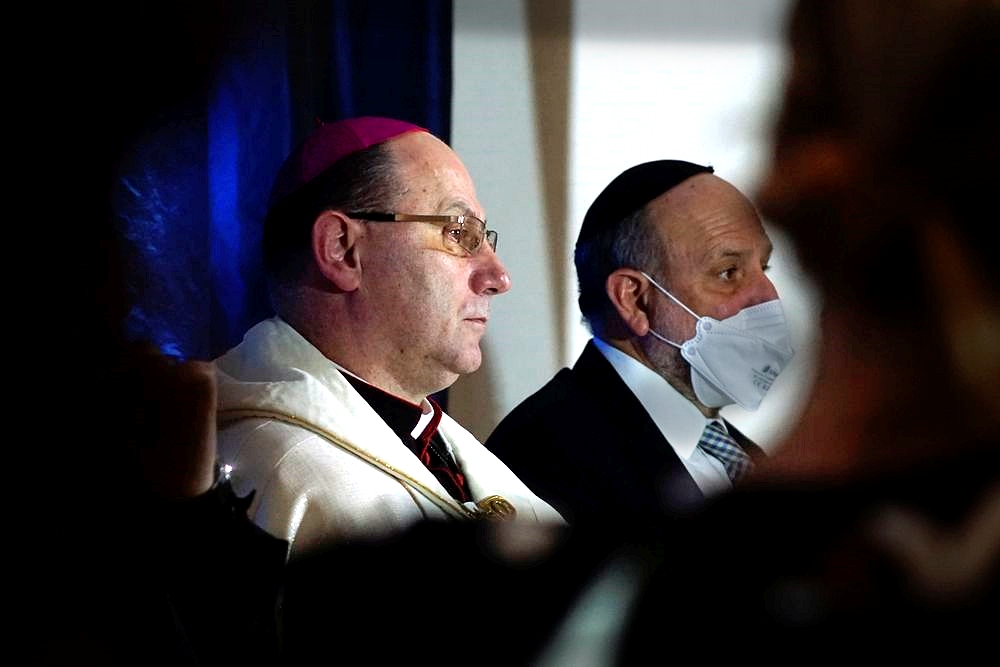
Day of Judaism in Poznań, credit2_archpoznan.pl
“In our time, anti-Semitism is anti-Christianity, and anti-Christianity is anti-Semitism,” said Rabbi Abraham Skorka of Argentina, a friend of Pope Francis, on the occasion of the XXV Day of Judaism in the Catholic Church celebrated in Poland on January 17th.
*
«En nuestro tiempo, el antisemitismo es anticristianismo, y el anticristianismo es antisemitismo», dijo el rabino Abraham Skorka de Argentina, amigo del Papa Francisco, con motivo de la XXV Jornada del Judaísmo en la Iglesia Católica celebrada en Polonia el 17 de enero.
*
“Nel nostro tempo l’antisemitismo è anticristianesimo e l’anticristianesimo è antisemitismo” – ha dichiarato dall’Argentina il rabbino Abraham Skorka, amico di Papa Francesco, in occasione della Giornata dell’Ebraismo nella Chiesa Cattolica celebrata in Polonia il 17 gennaio.
*
«У наші часи антисемітизм – це антихристиянство, а антихристиянство – це антисемітизм», – сказав рабин Авраам Скорка з Аргентини, друг Папи Франциска, з нагоди XXV Дня Юдаїзму в Католицькій Церкві, що відзначається в Польщі 17 січня.
On January 17th, the Archdiocese of Lublin, John Paul II Catholic University of Lublin, and the Archdiocesan Center for Catholic-Jewish Dialogue in Lublin organized a meeting devoted to the relations between Christians and Jews. In the event, which was broadcast on the Internet, Prof. Abraham Skorka delivered a lecture entitled “The Jewish-Catholic Dialogue 56 Years After Nostra Aetate.” Recalling the significance of Nostra Aetate—the Church’s declaration regarding Judaism, among others, published in 1965—, the Rabbi also discussed the multithreaded and centuries-old history of Jewish-Christian relations. Referring to the current situation, he emphasized: “The process of removing the Bible from the consciousness of the Western world continues. It is precisely in the issue of saving the brilliance of the Hebrew Bible in people’s minds that Jews and Christians are called to work together. None of us can do it alone.”
At the gathering, which was also attended by representatives of the Jewish community in Poland, Lublin’s Metropolitan Archbishop Stanislaw Budzik also took the floor, highlighting St. John Paul II’s contribution to the dialogue with Judaism and the purpose of this day, intended “to deepen the awareness of the Judaic roots of Christianity—to meet in a spirit of brotherhood and prayer with the local Jewish community.”
“The contacts between Catholics and followers of Judaism must be based on respect and dialogue, for they lead to mutual acceptance and understanding,” said Fr. Prof. Mirosław Kalinowski, Rector of the Catholic University of Lublin. He also emphasized that anti-Semitism is a grave sin that contradicts the Gospel and the teaching of the Catholic Church. “At the same time, we have the right to respect and tolerance for our system of values,” he added. He recalled that work is currently underway at the Catholic University of Lublin to establish a Center for the Study of the rescue of Jews by Poles and the rescue of Poles by Jews under the totalitarian systems.
During the meeting, the contributions to the Polish-Jewish dialogue of Fr. Grzegorz Pawłowski, who as a Jewish boy—Jakub Hersz Griner—was saved by Poles during the Holocaust, were recalled. After the war, he stayed in the orphanage of the Benedictine Sisters, and after passing his high school diploma, he entered the Major Seminary in Lublin and was ordained priest on April 20th, 1958. Fr. Grzegorz Pawłowski died last year in Israel, where he had been pastor of the Polish community since 1970.
The prayer of Christians and Jews, a common biblical service, and a review of the 25-year history of the Day of Judaism were the main points of the central celebrations of the Day of Judaism, which took place in Poznan.
The Jewish perspective on this quarter of a century of the Day of Judaism was outlined by Prof. Stanisław Krajewski, co-chairman of the Polish Council of Christians and Jews, and the Christian perspective was presented by Prof. Jan Grosfeld, member of the Committee for Dialogue with Judaism of the Polish Bishops’ Conference and winner of this year’s “Menorah of Dialogue” award, granted by the Association Coexist and the Signum Foundation for “bringing people, cultures, religions and nations together.”
Prof. Krajewski asked whether it has been possible during this time to build mutual respect and sensitivity to the other’s point of view among both Catholics and Jews. “There is no simple answer to this question. The most general context is the history of Christian-Jewish relations of the last 2,000 years, and from that perspective, current relations are more than good, and the Day of Judaism is a miracle. It was once unimaginable,” he concluded.
Reflecting on the words from the Book of the Prophet Isaiah: “My thoughts are not your thoughts,” the motto of this year’s meeting, rabbi Michael Schudrich, the Chief Rabbi of Poland, spoke about God’s mercy. He pointed out that, if a person who has sinned but asks God for forgiveness, he can expect God to show him mercy. “This is a great lesson for us, because when someone is harmed harm by another person, he should forgive him, he should be merciful as God is merciful,” said the Chief Rabbi of Poland.
Archbishop Grzegorz Ryś, in turn, commented on a passage from the Gospel of St. Luke in which Jesus speaks about loving one’s enemies. He pointed out that, in our consideration of the words of the prophet Isaiah: “My thoughts are not your thoughts,” we are invited to go beyond our own thinking and what we would like to call the principle of justice.
At the end of the biblical service Archbishop Wojciech Polak, Primate of Poland, said that the 25th anniversary of the Day of Judaism “should lead us towards what does not end, to the eternity of God, before Whose face we stand. This is also the source of our hope and joy.”
The Day of Judaism in the Catholic Church in Poland was established in 1997 by the Polish Bishops’ Conference on the initiative of Archbishop Stanislaw Gądecki, the current President of the Episcopate. It is celebrated on January 17th, on the eve of the Week of Prayer for Christian Unity. Its aim is to foster Christian-Jewish dialogue, as well as prayer and reflection on the relations between the two religions. The motto for this year’s celebration was the quote: “My thoughts are not your thoughts” (Isa 55:8).
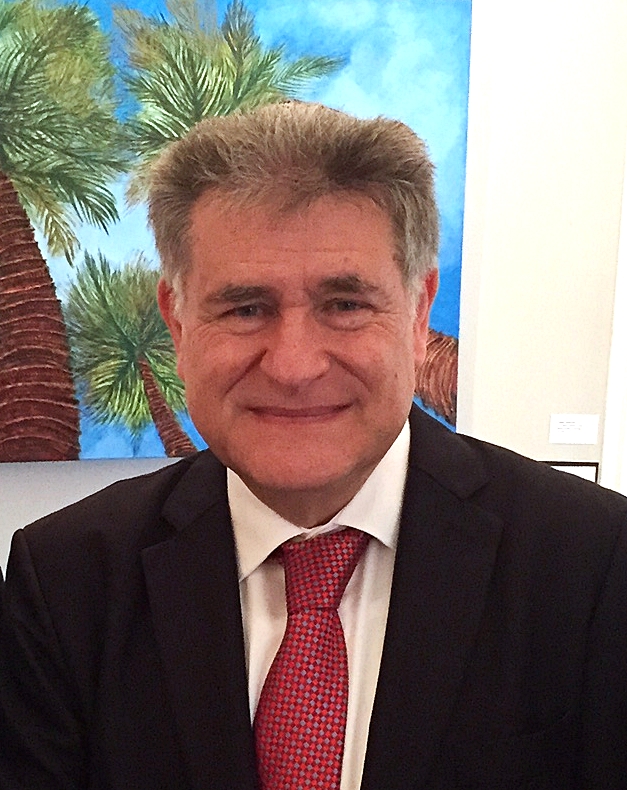
Rabbi Abraham Skorka, credit_wiki_Autorstwa Bob Watts – httpswww.flickr.comphotosbobwatts16327336672, CC BY 2.0, httpscom
*
El 17 de enero, la Archidiócesis de Lublin, la Universidad Católica Juan Pablo II de Lublin y el Centro Arquidiocesano para el Diálogo Católico-Judío de Lublin organizaron un encuentro dedicado a las relaciones entre cristianos y judíos. En el evento, que fue transmitido por Internet, el profesor Abraham Skorka pronunció una conferencia titulada «El diálogo judeo-católico 56 años después de Nostra Aetate». Recordando la importancia de Nostra Aetate -la declaración de la Iglesia sobre, entre otros, el judaísmo, publicada en 1965-, el rabino también habló de la historia multiforme y centenaria de las relaciones judeocristianas. Refiriéndose a la situación actual, subrayó: «El proceso de eliminación de la Biblia de la conciencia del mundo occidental continúa. Precisamente en la cuestión de salvar el brillo de la Biblia hebrea en la mente de la gente, todos nosotros judíos y cristianos estamos llamados a trabajar juntos. Ninguno de nosotros puede hacerlo solo».
En la reunión, a la que asistieron representantes de la comunidad judía de Polonia, también tomó la palabra el arzobispo metropolitano de Lublin, Stanislaw Budzik, quien destacó la contribución de San Juan Pablo II al diálogo con el judaísmo y la finalidad de esta jornada, destinada a «profundizar en el conocimiento de las raíces judaicas del cristianismo, para que nos encontremos en espíritu de fraternidad y oración con la comunidad judía local».
«Los contactos entre católicos y seguidores del judaísmo deben basarse en el respeto y el diálogo, ya que conducen a la aceptación y el entendimiento mutuos» dijo el P. Prof. Mirosław Kalinowski, Rector de la Universidad Católica de Lublin. También destacó que el antisemitismo es un pecado grave que contradice el Evangelio y la enseñanza de la Iglesia Católica. «Al mismo tiempo, tenemos derecho al respeto y a la tolerancia de nuestro sistema de valores», añadió. Recordó que actualmente se está trabajando en la Universidad Católica de Lublin en la creación de un Centro para el estudio de los judíos rescatados por polacos y de los polacos rescatados por judíos bajo los regímenes totalitarios.
Durante la reunión se recordaron las aportaciones al diálogo polaco-judío Don Grzegorz Pawłowski, que siendo un niño judío -Jakub Hersz Griner- fue salvado por polacos durante el Holocausto. Después de la guerra, permaneció en el orfanato de las Hermanas Benedictinas, y tras aprobar el bachillerato, ingresó en el Seminario Mayor de Lublin y fue ordenado sacerdote el 20 de abril del 1958. Don Grzegorz Pawłowski murió el año pasado en Israel, donde era párroco de la comunidad polaca desde 1970.
La oración de cristianos y judíos, un servicio bíblico común y un repaso a los 25 años de historia del Día del Judaísmo fueron los puntos principales de las celebraciones centrales del Día del Judaísmo, que tuvieron lugar en Poznan.
La perspectiva judía de la Jornada del Judaísmo en este cuarto de siglo fue expuesta por el profesor Stanisław Krajewski, copresidente del Consejo Polaco de Cristianos y Judíos, y la perspectiva cristiana fue presentada por el profesor Jan Grosfeld, miembro del Comité para el Diálogo con el Judaísmo de la Conferencia Episcopal Polaca y ganador del premio «Menorah del Diálogo» de este año, concedido por la Asociación Coexist y la Fundación Signum por «acercar a personas, culturas, religiones y naciones».
El profesor Krajewski se preguntó si ha sido posible durante este tiempo construir el respeto mutuo y la sensibilidad hacia el punto de vista del otro, tanto entre católicos como entre judíos. «No hay una respuesta sencilla a esta pregunta. El contexto más general es la historia de las relaciones cristiano-judías de los últimos 2.000 años, y desde esa perspectiva, las relaciones actuales son más que buenas, y el Día del Judaísmo es un milagro. Antes era inimaginable», concluyó.
Reflexionando sobre las palabras del Libro del Profeta Isaías: «Mis pensamientos no son vuestros pensamientos», lema de la reunión de este año, el rabino Michael Schudrich, Gran Rabino de Polonia, habló de la misericordia de Dios. Señaló que, si una persona que ha pecado pide perdón a Dios, puede esperar que Él le muestre su misericordia. «Esta es una gran lección para nosotros, porque cuando uno es herido por alguien, debe perdonarle, debe ser misericordioso como Dios es misericordioso», dijo el Gran Rabino de Polonia.
El arzobispo Grzegorz Ryś, por su parte, comentó un pasaje del Evangelio de San Lucas en el que Jesús habla de amar a los enemigos. Señaló que, al considerar las palabras del profeta Isaías: «Mis pensamientos no son vuestros pensamientos», se nos invita a ir más allá de nuestro propio pensamiento y de lo que quisiéramos llamar el principio de justicia.
Al final del servicio bíblico, el Arzobispo Wojciech Polak, Primado de Polonia, dijo que el 25º aniversario del Día del Judaísmo «ha de conducirnos hacia lo que no termina, hacia la eternidad de Dios, ante cuyo rostro estamos. Esta es también la fuente de nuestra esperanza y alegría».
El Día del Judaísmo en la Iglesia Católica de Polonia fue establecido en 1997 por la Conferencia Episcopal Polaca a iniciativa del arzobispo Stanislaw Gądecki, actual presidente del episcopado. Se celebra el 17 de enero, en vísperas de la Semana de Oración por la Unidad de los Cristianos. Su objetivo es fomentar el diálogo cristiano-judío, así como la oración y la reflexión sobre las relaciones entre ambas religiones. El lema de la celebración de este año fue la cita: «Mis pensamientos no son vuestros pensamientos» (Is 55,8).
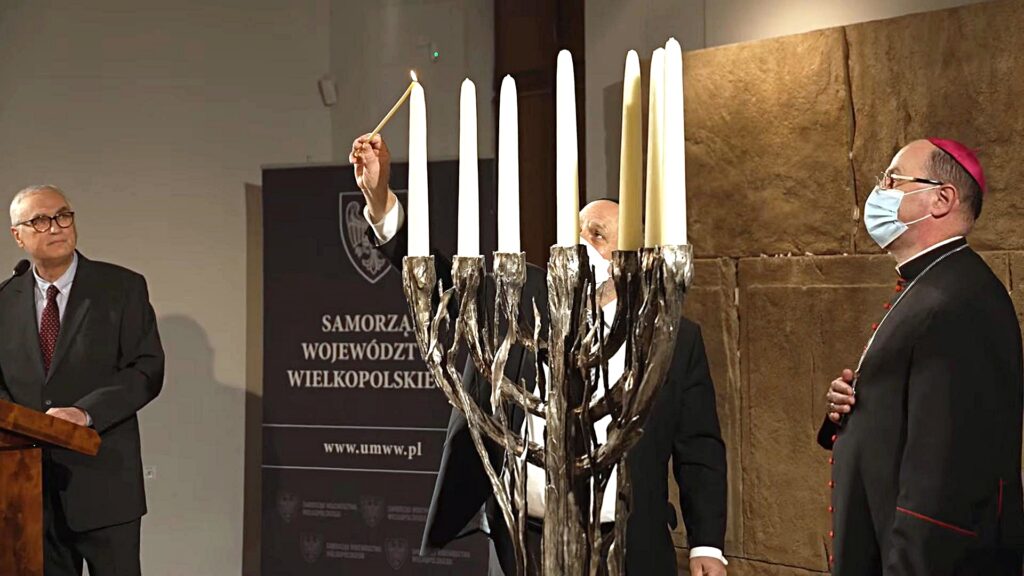
Day of Judaism in Poznań, credit_archpoznan.pl
*
L’Arcidiocesi di Lublino, l’Università Cattolica Giovanni Paolo II di Lublino e il Centro Arcidiocesano per il Dialogo ebraico-cattolico di Lublino il 17 gennaio hanno organizzato un incontro sui rapporti tra cristiani ed ebrei. Durante l’evento, trasmesso su Internet, il prof. Abraham Skorka ha tenuto una conferenza intitolata “Il Dialogo ebraico-cattolico 56 anni dopo la Nostra Aetate”. Il rabbino, ricordando l’importanza di Nostra aetate, cioè della dichiarazione della Chiesa del 1965 concernente, tra l’altro, Ebraismo, ha parlato anche della multiforme e secolare storia delle relazioni ebraico-cristiane. Riferendosi alla situazione attuale, ha sottolineato: “Il processo di rimozione della Bibbia dalla coscienza del mondo occidentale continua. È proprio per salvare lo splendore della Bibbia ebraica nella mente della gente che ebrei e cristiani sono chiamati ad un lavoro comune. Nessuno di noi può farcela da solo”.
Nell’incontro, a cui hanno partecipato anche rappresentanti della comunità ebraica in Polonia, ha preso la parola mons. Stanisław Budzik, Arcivescovo di Lublino, che ha sottolineato il contributo di S. Giovanni Paolo II nel dialogo con l’ebraismo e lo scopo di questa giornata, che è “approfondire la consapevolezza delle radici ebraiche del cristianesimo – incontro in spirito di fraternità e preghiera con la comunità ebraica locale”.
“La base per i contatti tra cattolici e i fedeli dell’ebraismo deve essere il rispetto e il dialogo, perché conducono all’accettazione e alla comprensione reciproca”, ha affermato il Rev.do Prof. Mirosław Kalinowski, Rettore dell’Università Cattolica di Lublino. Ha anche sottolineato che l’antisemitismo è un peccato grave che contraddice il Vangelo e l’insegnamento della Chiesa cattolica. “Allo stesso tempo, abbiamo il diritto al rispetto e alla tolleranza per il nostro sistema di valori” – ha aggiunto. Ha ricordato che l’Università Cattolica di Lublino sta attualmente lavorando alla creazione di un Centro di Ricerca sui Polacchi che hanno salvato gli Ebrei e sugli Ebrei che hanno salvato i Polacchi al tempo del totalitarismo.
Durante l’incontro, sono stati ricordati i contributi al dialogo ebraico-polacco del Protonotario Apostolico Grzegorz Pawłowski, che da ragazzo ebreo – Jakub Hersz Griner –durante l’Olocausto è stato salvato da persone polacche. Dopo la guerra rimase nell’orfanotrofio delle monache benedettine e, dopo il diploma di maturità scientifica, entrò nel Seminario Maggiore di Lublino e fu ordinato sacerdote il 20 aprile 1958. Il Protonotario Apostolico Grzegorz Pawłowski è morto l’anno scorso in Israele, dove dal 1970 era cappellano della diaspora polacca.
La preghiera di cristiani ed ebrei, il servizio biblico congiunto e la sintesi dei 25 anni di storia della Giornata dell’ebraismo sono stati i punti principali delle celebrazioni centrali della Giornata dell’Ebraismo, svoltasi a Poznań.
La prospettiva ebraica sui 25 anni della Giornata dell’Ebraismo è stata delineata dal prof. Stanisław Krajewski, co-presidente del Consiglio Polacco dei Cristiani e degli Ebrei, mentre la prospettiva cristiana è stata presentata dal prof. Jan Grosfeld, membro del Comitato per il Dialogo con l’Ebraismo della Conferenza Episcopale Polacca, vincitore del premio “Menora Dialogu” di quest’anno, premiato dell’Associazione Coexist e della Fondazione Signum per “aver unito persone, culture, religioni e nazioni”.
Il Prof. Krajewski si domandava se in questo momento fosse possibile creare reciprocamente rispetto e sensibilità per il punto di vista dell’altra parte sia nei cattolici che negli ebrei. – “Non esiste una risposta semplice a questa domanda. Il contesto più generale è la storia delle relazioni ebraico-cristiane degli ultimi 2000 anni e, da questa prospettiva, le relazioni attuali sono più che buone e la Giornata dell’Ebraismo è un miracolo. Un tempo questo era impensabile” – ha dichiarato.
Riflettendo sulle parole del Libro del profeta Isaia, che sono il motto dell’incontro di quest’anno, “I miei pensieri non sono i vostri pensieri”, il rabbino capo della Polonia, Rabbi Michael Schudrich, ha parlato della misericordia di Dio. Ha sottolineato che se un uomo ha peccato ma chiede perdono a Dio, può aspettarsi che Dio gli mostri misericordia. “Questa è una grande lezione per noi, perché quando un uomo subisce un torto da un altro, dovrebbe perdonarlo, dovrebbe essere come il Dio misericordioso” – ha affermato il rabbino capo della Polonia.
A sua volta, l’Arcivescovo Grzegorz Ryś ha commentato un frammento del Vangelo di S. Luca, in cui Gesù parla dell’amore per i nemici. Ha sottolineato che meditando sulle parole del profeta Isaia: “I miei pensieri non sono i vostri pensieri”, siamo invitati a trascendere il nostro pensiero e quello che vorremmo chiamare il principio di giustizia.
Al termine della liturgia biblica, l’Arcivescovo Wojciech Polak, Primate di Polonia, ha affermato che i 25 anni della Giornata dell’Ebraismo “dovrebbero portare a ciò che non finisce mai, che è l’eternità di Dio, davanti al cui volto ci troviamo. Questa è anche la fonte della nostra speranza e della nostra gioia”.
La Giornata dell’ebraismo nella Chiesa cattolica in Polonia è stata istituita nel 1997 dalla Conferenza Episcopale Polacca su iniziativa dell’Arcivescovo Stanisław Gądecki, attuale Presidente dell’Episcopato. Si celebra alla vigilia dell’inizio della Settimana di Preghiera per l’Unità dei Cristiani – il 17 gennaio. Il suo obiettivo è sviluppare il dialogo ebraico-cristiano, ma anche pregare e riflettere sul rapporto tra le due religioni. Il motto della festa di quest’anno è stata la citazione: “I miei pensieri non sono i vostri pensieri” (Is 55,8).
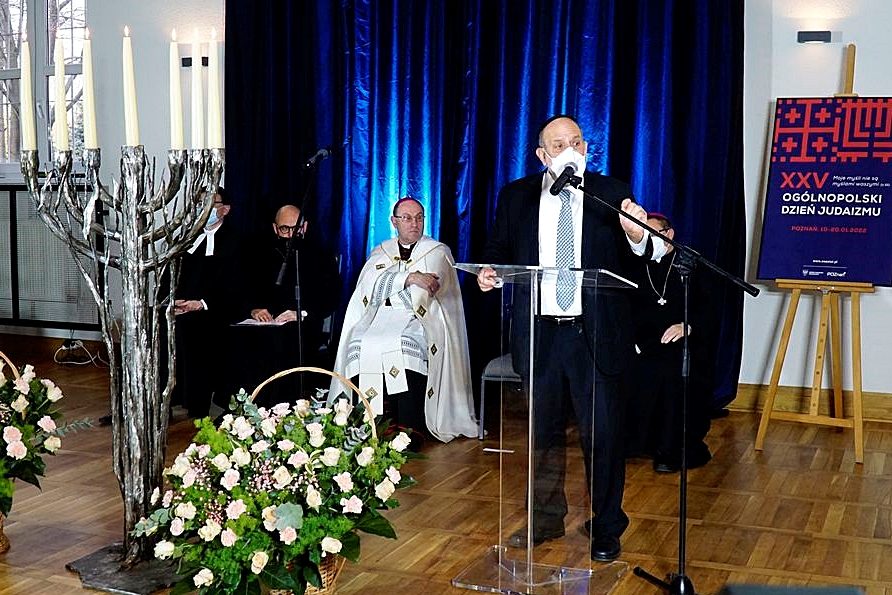
Day of Judaism in Poznań, credit1_archpoznan.pl
*
Люблінська архідієцезія, Люблінський католицький університет імені Івана Павла ІІ та Архідієцезіальний Центр Католицько-Юдейського Діалогу в Любліні організували 17 січня зустріч, присвячену стосункам між християнами та юдеями. У заході, що транслювався в Інтернеті, проф. Авраам Скорка прочитав лекцію під назвою «Єврейсько-католицький діалог через 56 років після Nostra Aetate». Рабин, нагадуючи про важливість Nostra Aetate – декларації Церкви від 1965 року щодо, зокрема, Юдаїзму, розповів також про багатогранну та багатовікову історію юдео-християнських відносин. Говорячи про нинішню ситуацію, він наголосив: «Процес вилучення Біблії зі свідомості західного світу триває. Юдеї та християни покликані працювати разом, щоб зберегти блиск єврейської Біблії у свідомості людей. Ніхто з нас не може зробити цього сам».
На зустрічі, в якій також взяли участи представники єврейської громади Польщі, слово взяв Люблінський Архієпископ Станіслав Будзик, який підкреслив внесок св. Івана Павла ІІ в діалог з юдаїзмом та сьогоднішню мету, яка полягає в «поглибленні усвідомлення юдейських коренів християнства – зустріч у дусі братерства та молитви з місцевою єврейською громадою».
«Основою для контактів між католиками та послідовниками юдаїзму мають бути повага та діалог, адже вони ведуть до взаємного прийняття та розуміння», – зазначив ректор Люблінського католицького університету о. проф. Мирослав Калиновський. Він також наголосив, що антисемітизм є тяжким гріхом, який суперечить Євангелію та вченню Католицької Церкви. «Водночас ми маємо право на повагу та толерантність до нашої системи цінностей», – додав він. Він нагадав, що зараз Люблінський католицький університет працює над створенням Центру досліджень порятунку поляками євреїв та євреями поляків у часах тоталітаризму.
Під час зустрічі було згадано про внесок у польсько-єврейський діалог о. Ґжегожа Павловського, якого, ще як єврейського хлопчика Якуба Герша Грінера, врятували поляки під час Голокосту. Після війни він залишився в будинку сиріт сестер-бенедиктинок, а після закінчення середньої школи вступив до Вищої духовної семінарії в Любліні і 20 квітня 1958 року був висвячений у священика. Отець Ґжегож Павловський помер торік в Ізраїлі, де з 1970 року був священиком польської громади.
Молитва християн та юдеїв, спільне біблійне служіння та підсумування 25-річної історії Дня Юдаїзму – головні моменти відзначення Дня Юдаїзму, яке відбулося в Познані.
Єврейський погляд на чверть століття Дня Юдаїзму окреслив проф. Станіслав Краєвський, співголова Польської Ради Християн та Юдеїв, а християнську перспективу представив проф. Ян Гросфельд, член Комітету Конференції єпископату Польщі щодо діалогу з юдаїзмом, лауреат цьогорічної премії «Менора Діалогу», що присуджується Асоціацією Coexist та Фондом Signum за «об’єднання людей, культур, релігій і народів».
Професор Краєвський задався питанням, чи вдалося за цей час розвинути взаємну повагу та чутливість до точки зору іншої сторони, як у католиків, так і у юдеїв.
– На це питання немає простої відповіді. Найзагальнішим контекстом є історія християнсько-юдейських відносин за останні 2000 років, і з цієї перспективи, нинішні стосунки є більш ніж хорошими, а День Юдаїзму — це диво. Раніше це було немислимо», – підкреслив проф. Краєвський.
Роздумуючи над словами з Книги пророка Ісаї, які стали девізом цьогорічної зустрічі: «Мої думки – це не ваші думки», Рабин Міхаель Шудрих, Головний Рабин Польщі, розповів про Боже милосердя. Він зазначив, що якщо людина згрішила, але буде просити у Бога прощення, вона може очікувати, що Бог виявить до неї милосердя. «Це великий урок для нас, тому що, коли людина зазнає зла від іншого, вона має пробачити її, вона має бути як милосердний Бог», – сказав головний рабин Польщі.
У свою чергу архієпископ Гжегож Рис прокоментував фрагмент Євангелія від св. Луки, в якій Ісус говорить про любов до своїх ворогів. Він зазначив, що, розмірковуючи над словами пророка Ісаї: «Мої думки — це не ваші думки», ми запрошуємось вийти за межі свого мислення і того, що ми хотіли б назвати принципом справедливості.
На завершення біблійного служіння Архієпископ Войцех Поляк, Примас Польщі, сказав, що 25 років Дня Юдаїзму «повинні привести до того, що ніколи не закінчується, а це є вічність Бога, перед обличчям Якого ми стоїмо. Це також джерело нашої надії та радості».
День Юдаїзму в Католицькій Церкві в Польщі був встановлений у 1997 році Конференцією єпископату Польщі з ініціативи архієпископа Станіслава Гандецького, нинішнього Голови Єпископату. День Юдаїзму відзначається за день до початку Тижня Молитов за Єдність Християн – 17 січня. Його метою є розвиток християнсько-юдейського діалогу, а також молитва та роздуми про стосунки між двома релігіями. Девізом цьогорічного відзначення стали слова: «Мої думки — не ваші думки» (Іс 55:8).
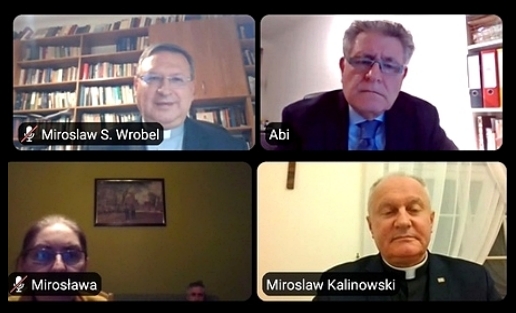
Meeting online in Lublin, credit_Zoom, screen




Dodaj komentarz